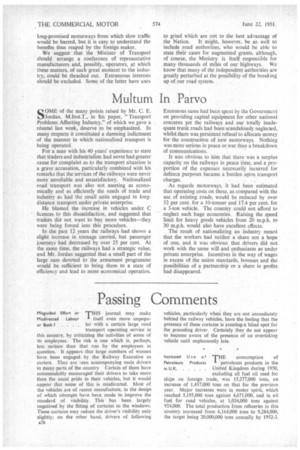Multum In Parvo
Page 28

If you've noticed an error in this article please click here to report it so we can fix it.
SOME of the many points raised by Mr. C. E. Jordan, M.Inst.T., in his paper, "Transport Problems Affecting Industry," of which we gave a resume last week, deserve to be emphasized. In many respects it constituted a damning indictment of the manner in which nationalized transport is being operated.
For a man with his 40 years' experience to state that traders and industrialists had never had greater cause for complaint as to the transport situation is a grave accusation, particularly combined with his remarks that the services of the railways were never more unreliable and unsatisfactory. Nationalized road transport was also not meeting as economically and as efficiently the needs of trade and industry as had the small units engaged in longdistance transportamder private enterprise.
He blamed the -increase in vehicles under C licences to this dissatisfaction, and suggested that traders did not want to buy more vehicles—they were being forced into this procedure.
In the past 12 years the railways had shown a slight increase in tonnage carried, but passenger journeys had decreased by over 25 per cent. At the same time, the railways had a strategic value, and Mr. Jordan suggested that a small part of the large sum devoted to the armament programme would be sufficient to bring them to a state of efficiency and lead to more economical operation. Enormous sums had been spent by the Government on providing capital equipment for other national concerns yet the railways and our totally inadequate trunk roads had been scandalously neglected, whilst there was persistent refusal to allocate money for the construction of new motorways. Nothing was more serious in peace or war than a breakdown of communications.
It was obvious to him that there was a surplus capacity on the railways in peace time, and a proportion of the expenses necessarily incurred for defence purposes became a burden upon transport charges.
As regards motorways, it had been estimated that operating costs on these, as compared with the use of existing roads, would be reduced by over 32 per cent. for a 10-tonner and 17.4 per cent, for a 3-ton vehicle. The country could not afford to neglect such huge economies. Raising the speed limit for heavy goods vehicles from 20 m.p.h. to 30 m.p.h. would also have excellent effects.
The result of nationalizing an industry meant that the workers had neither a share nor a hope of one, and it was obvious that drivers did not work with the same will and enthusiasm as under private enterprise. Incentives in the way of wages in excess of the union standards, bonuses and the possibilities of a partnership or a share in profits had disappeared.




















































































